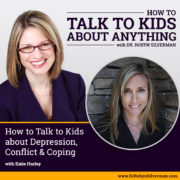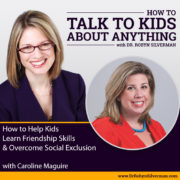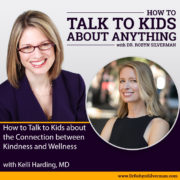How to Talk to Kids about Depression, Conflict & Coping with Katie Hurley
Special guest: Katie Hurley
According to the US Department of Health and Human Services, approximately one out of five teens has a mental health disorder, diagnosable by clinical methods, and nearly one-third show symptoms of depression. Now you might be thinking- well, many teens seem depressed to me, their moods and their emotions are all over the place! Stress is overwhelming! Yes, that can be true- symptoms of depression in adolescents aren’t always easy to identify because they often appear as normal adolescent behavior. But if we keep an eye open for consistent depressed behavior and indicators like, fatigue, changes in sleep patterns, changes in eating patterns, social withdrawal, and/or anger- these can serve as early warning signs that can allow us to get help for our teens as depression is absolutely treatable but NOT fixable on its own. Teens who have depression need therapy, support at home and yes, some also need medication. There’s no quick fix and thankfully, we have Katie Hurley here to explain how we know if our child needs help, what we and our teens can do at home to assist and what exercises and tools we can use to improve mood, self-esteem and motivation.
Katie Hurley, LCSW, is a child and adolescent psychotherapist, parenting expert, and writer. She is the founder of “Girls Can!” empowerment groups for girls between ages 5-11. Hurley is the author of The Happy Kid Handbook” “No More Mean Girls,” (both subjects we have interviewed Katie on previously on How to Talk to Kids about Anything) and her new workbook, The Depression Workbook for Teens, which is the #1 new release on Amazon for Teen and Young Adult Self Esteem and Self Reliance Issues. Her work can be found in The Washington Post, PBS Parents, and US News and World Report, among other places. She practices psychotherapy in the South Bay area of Los Angeles and earned her BA in psychology and women’s studies from Boston College and her MSW from the University of Pennsylvania. She splits her time between California and Connecticut with her husband and two children.



